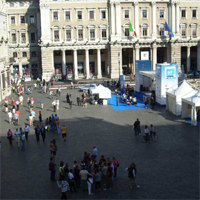Total Quality and Total Mobility
Abstract
FIABA ONLUS (Italian Fund for Elimination of Architectural Barriers) was founded in 2000 with the aim of promoting a culture of equal opportunities and, above all, it has as its main goal to involve public and private institutions to create a really accessible and usable environment for everyone. Total accessibility, Total usability and Total mobility are key indicators to define quality of life within cities. A supportive environment that is free of architectural, cultural and psychological barriers allows everyone to live with ease and universality. In fact, people who access to goods and services in the urban context can use to their advantage time and space, so they can do their activities and can maintain relationships that are deemed significant for their social life. The main aim of urban accessibility is to raise the comfort of space for citizens, eliminating all barriers that discriminate people, and prevent from an equality of opportunity. “FIABA FUND - City of ... for the removal of architectural barriers” is an idea of FIABA that has already affected many regions of Italy as Lazio, Lombardy, Campania, Abruzzi and Calabria. It is a National project which provides for opening a bank account in the cities of referring, in which for the first time, all together, individuals and private and public institutions can make a donation to fund initiatives for the removal of architectural barriers within its own territory for a real and effective total accessibility. Last February the fund was launched in Rome with the aim of achieving a Capital without barriers and a Town European model of accessibility and usability. Urban mobility is a prerequisite to access to goods and services, and to organize activities related to daily life. FIABA promotes the concept of sustainable mobility for all, supported by the European Commission’s White Paper. We need a cultural change in management and organization of public means, which might focus on individual in its totality, with all its needs. For this reason it is necessary to focus on output of public and private transports which must be totally and globally accessible. Metropolitan and suburban transports need to have modern buses, and it has been calculated that it is possible to provide a total replacement of the fleet in a period from five to ten years. Total Quality must become the goal of every Local Government. FIABA suggests that a Total Quality Manager be always present in the institutional environment, as a guarantor of quality perceived by people living in their city for tourism, work, and leisure. It is essential to establish a favorable environment for all, to ensure the comfort of 100% of the population to give some definite and reliable answers.Downloads
References
Andreani V., Tortorella W. (2009) “Rapporto Cittalia 2009, città mobili”, Cittalia Fondazione Anci ricerche.
Borlini B., Memo F. (2009) “Ripensare l’accessibilità urbana”, Cittalia Fondazione Anci ricerche.
Brocato Cecchi R. (2008) “Dedicato a Giovanna…ma anche a tutti gli altri!”.
Calzolaio F. (1996) “Mobility Housing, residenze collettive per persone limitate nella mobilità”, Gangemi Editore.
Commissione Europea “Libro Bianco – La politica europea dei trasporti fino al 2010: il momento delle scelte”, Ufficio delle Pubblicazioni Ufficiali delle Comunità Europee.
Convegno OPAF, Lecco. (2009) “Per un progetto condiviso della città accessibile, proposte e percorsi per il superamento delle barriere architettoniche in Provincia di Lecco.
Koenig, G. K. (1986) “Come si misura la qualità della vita”, in Ottagono n. 83.
Marzi L. (2009) “Piani per l’eliminazione delle barriere architettoniche: esperienze in Toscana”, TeMA, n.2.
Nuvolati G. (1993) “Qualità della vita. definizione, prospettive di analisi e indicatorisociali”, Sociologia Urbana e Rurale, n. 41, pp. 99-121.
Nuvolati G. (1998) “La qualità della vita delle città. Metodi e risultati delle ricerche comparate”, Franco Angeli, Milano.
Sen A. (1985) “Commodities and Capabilities, North Holland, Amsterdam.
Scotto F. (2008) “Le politiche dei trasporti nelle aree urbane. La sfida dei Comuni nel governo della mobilità”, Cittalia Fondazione Anci ricerche.
Zajczyk F. (2000) “Tempi di vita e orari della città. La ricerca sociale e il governo urbano”, Franco Angeli, Milano.

Copyright (c) 2014 Tema. Journal of Land Use, Mobility and Environment

This work is licensed under a Creative Commons Attribution 4.0 International License.
Authors who publish in this journal agree to the following:
1. Authors retain the rights to their work and give in to the journal the right of first publication of the work simultaneously licensed under a Creative Commons License - Attribution that allows others to share the work indicating the authorship and the initial publication in this journal.
2. Authors can adhere to other agreements of non-exclusive license for the distribution of the published version of the work (ex. To deposit it in an institutional repository or to publish it in a monography), provided to indicate that the document was first published in this journal.
3. Authors can distribute their work online (ex. In institutional repositories or in their website) prior to and during the submission process, as it can lead to productive exchanges and it can increase the quotations of the published work (See The Effect of Open Access)
